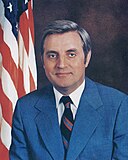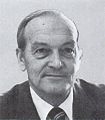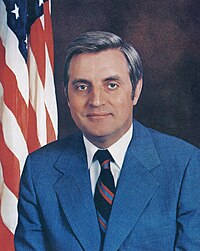
The 1984 United States presidential election was the 50th quadrennial presidential election, held on Tuesday, November 6, 1984. Incumbent Republican President Ronald Reagan and his running mate, incumbent Vice President George H. W. Bush, were re-elected to a second term in a landslide. They defeated the Democratic ticket of former Vice President Walter Mondale and Congresswoman Geraldine Ferraro.
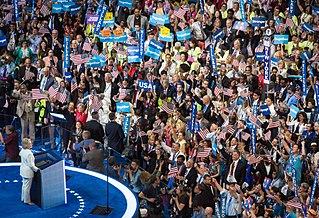
The Democratic National Convention (DNC) is a series of presidential nominating conventions held every four years since 1832 by the United States Democratic Party. They have been administered by the Democratic National Committee since the 1852 national convention. The primary goal of the Democratic National Convention is to officially nominate a candidate for president and vice president, adopt a comprehensive party platform, and unify the party. Pledged delegates from all fifty U.S. states, the District of Columbia, and the American territories, and superdelegates which are unpledged delegates representing the Democratic establishment, attend the convention and cast their votes to choose the party's presidential candidate. Like the Republican National Convention, the Democratic National Convention marks the formal end of the primary election period and the start of the general election season. Since the 1980s, national conventions have become mostly inaugural events for the winning candidate, since winners are announced long before the convention. In 2020, both major parties, and many minor parties, replaced their usual in-person conventions with virtual programs due to the COVID-19 pandemic.

Marie Corinne Morrison Claiborne Boggs was a politician who served as a member of the U.S. House of Representatives and later as United States Ambassador to the Holy See. She was the first woman elected to Congress from Louisiana. She was also a permanent chairwoman of the 1976 Democratic National Convention, which met in New York City to nominate the Carter-Mondale ticket. She was the first woman to preside over a major party convention.

The 1972 Democratic National Convention was the presidential nominating convention of the Democratic Party for the 1972 presidential election. It was held at Miami Beach Convention Center in Miami Beach, Florida, also the host city of the Republican National Convention that year, on July 10–13, 1972. Lawrence F. O'Brien served as permanent chairman of the convention, while Yvonne Braithwaite Burke served as vice-chair, becoming the first African American and the first woman of color to hold that position. On the last day of the convention, Lawrence F. O'Brien departed and Burke was left to preside for about fourteen hours.
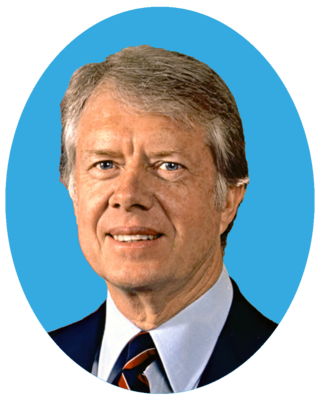
The 1980 Democratic National Convention nominated President Jimmy Carter and Vice President Walter Mondale for reelection. The convention was held in Madison Square Garden in New York City from August 11 to August 14, 1980.

The 1976 Democratic National Convention met at Madison Square Garden in New York City, from July 12 to July 15, 1976. The assembled United States Democratic Party delegates at the convention nominated former Governor Jimmy Carter of Georgia for president and Senator Walter Mondale of Minnesota for vice president. John Glenn and Barbara Jordan gave the keynote addresses. Jordan's keynote address made her the first African-American woman to deliver the keynote address at a Democratic National Convention. The convention was the first in New York City since the 103-ballot 1924 convention.

The 1960 Democratic National Convention was held in Los Angeles, California, on July 11–15, 1960. It nominated Senator John F. Kennedy of Massachusetts for president and Senate Majority Leader Lyndon B. Johnson of Texas for vice president.

The 1956 Democratic National Convention nominated former Governor Adlai Stevenson of Illinois for president and Senator Estes Kefauver of Tennessee for vice president. It was held in the International Amphitheatre on the South Side of Chicago from August 13 to August 17, 1956. Unsuccessful candidates for the presidential nomination included Governor W. Averell Harriman of New York, Senator Lyndon B. Johnson of Texas, and Senator Stuart Symington of Missouri.
The 1900 Democratic National Convention was a United States presidential nominating convention that took place the week of July 4, 1900, at Convention Hall in Kansas City, Missouri.
A brokered convention, in US politics, can occur during a presidential election when a political party fails to choose a nominee on the first round of delegate voting at the party's nominating convention.
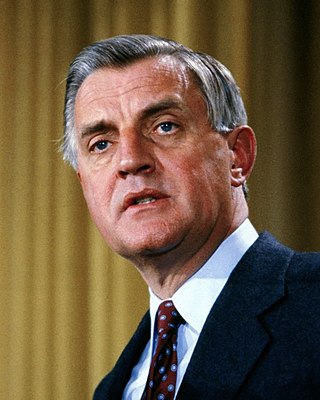
From February 20 to June 12, 1984, voters of the Democratic Party chose its nominee for president in the 1984 United States presidential election. Former Vice President Walter Mondale was selected as the nominee through a series of primary elections and caucuses culminating in the 1984 Democratic National Convention held from July 16 to July 19, 1984, in San Francisco, California.

From January 21 to June 3, 1980, voters of the Democratic Party chose its nominee for president in the 1980 United States presidential election. Incumbent President Jimmy Carter was again selected as the nominee through a series of primary elections and caucuses, culminating in the 1980 Democratic National Convention, held from August 11 to 14, 1980, in New York City.
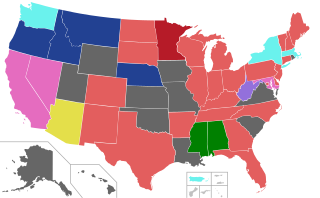
From January 27 to June 8, 1976, voters of the Democratic Party chose its nominee for president in the 1976 United States presidential election. Former Georgia governor Jimmy Carter was selected as the nominee through a series of primary elections and caucuses culminating in the 1976 Democratic National Convention held from July 12 to July 15, 1976, in New York City.

The 1980 United States presidential election in Illinois took place on November 4, 1980. All 50 states and The District of Columbia, were part of the 1980 United States presidential election. State voters chose 26 electors to the Electoral College, who voted for president and vice president. Illinois voters chose between the Democratic ticket of incumbent president Jimmy Carter and vice president Walter Mondale, and the Republican ticket of Ronald Reagan and running mate George H. W. Bush, as well as the independent candidacy of John B. Anderson and running mate Patrick Lucey.
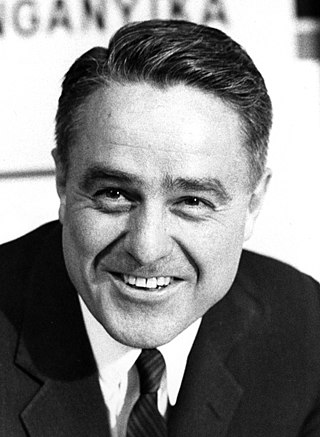
This article lists those who were potential candidates for the Democratic nomination for Vice President of the United States in the 1972 election.

The selection of the Democratic Party's vice presidential candidate for the 1956 United States presidential election occurred at the party's national convention on August 16, 1956. Former presidential candidate and Tennessee's Senator Estes Kefauver defeated Massachusetts' Senator John F. Kennedy.

The 1980 presidential campaign of Ted Kennedy, United States Senator from Massachusetts, was formally launched on November 7, 1979, as Senator Kennedy, the youngest Kennedy brother, announced his intention to seek the Democratic Party nomination for the presidency of the United States in the 1980 presidential election against incumbent President Jimmy Carter.

The 1980 Iowa Democratic presidential caucuses were held on January 21, 1980, as part of the Democratic Party primaries for the 1980 United States presidential election. 200 total pledged delegates to the 1980 Democratic National Convention were allocated to presidential candidates. Incumbent President Jimmy Carter won the contest.

In the 1980 United States presidential election, incumbent president Jimmy Carter and incumbent vice president Walter Mondale were defeated by Republican presidential nominee Ronald Reagan and vice presidential nominee George H. W. Bush.
